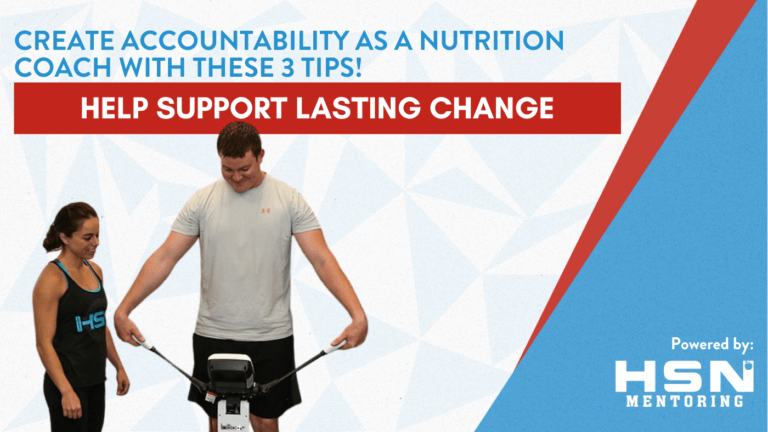As a nutrition coach, one of your primary roles is to create accountability for your clients. The roles and tasks of a nutrition coach run deep regarding client management. We assign habits & action steps, review food pictures, and suggest strategies to help clients reach their goals. But the most important aspect of coaching we cannot overlook is holding our clients accountable.
Just like your clients have workplace accountability, they also need health & nutrition accountability. There is enough information online for a person to reach their health and wellness goals alone as long as they choose a good source. But, the reason why 41.9% of our population is obese and walking around with self induced chronic disease is that nobody is holding them accountable to make a change.
If I was given a penny every time I’ve heard someone say, “I know what to do, I’m just not doing it,” I would be a rich girl.
In this blog post we will provide three tips for nutrition coaches to create accountability for their clients.
What Does It Mean To Create Accountability?

Creating accountability means establishing a sense of responsibility or obligation for someone to follow through with their commitments or goals. When you create accountability, you are helping someone stay on track and motivated.
By creating accountability, you can help someone stay focused and motivated to achieve their goals and increase their chances of success.
It’s important to note that accountability should be implemented in a supportive and non-judgmental way, as the goal is to help someone succeed, not to punish them for any perceived failures.
Why Is It Important To Create Accountability For Your Clients As A Nutrition Coach?

Most people are not intrinsically motivated. Creating accountability for clients is essential for a nutrition coach because it can help clients stay on track with their health goals and increase their chances of success. When clients have someone they are accountable to, they are more likely to follow through with their commitments, and this is especially true when it comes to making lifestyle changes.
By holding clients accountable, nutrition coaches can provide a level of support and motivation that can help them stay focused and motivated, even when faced with challenges or setbacks. Additionally, by you creating this accountability culture, clients begin taking personal responsibility for their actions, and they are more likely to follow through with their goals knowing that someone else is expecting them to do so.
Overall, creating accountability is a crucial part of a nutrition coach’s role in helping clients achieve their goals and can be a powerful tool for driving progress and success.
3 Tips To Create Accountability For Your Nutrition Clients
As nutrition coaches, it’s important to remember that when coaching our clients we need to have them focus on only implementing one healthy habit at a time. When we try to implement more than that, our clients’ success rate goes down considerably. Also important is creating a plan for how this particular habit will be applied to their life. Doing so will increase the likelihood the habit will stick.
Remembering this key point is crucial to our clients success. Initially, clients will challenge your theory on this and blame you for moving too slowly. However, encourage them to have some understanding that what they are currently doing isn’t working, which is why they have sought out you to help them.
When I do this, and ask them to “do it my way” for a month, they often become more willing to discuss my theory.

Tip #1 - Define The Behavior, Habit, Goal or Outcome That Is Desired
This tip seems pretty self explanatory however; you would be surprised by the number of times clear expectations, aka a client journey, have not been discussed in a coach/client relationship. When people are not clear on their expectations and have not set goals nor discussed desired outcomes, it becomes pretty challenging to be held accountable for something that is ambiguous.
At HSN Mentoring, we teach all of our nutrition coaches to discuss with their clients the journey and desired outcomes. In doing so, they lay out a clear path and can provide opportunities for milestones to be met by implementing action items that will help clients learn the habits necessary to reach their goals. Additionally, the client has no other alternative than to take full responsibility as a leader in their mission to accomplish their individual goals.
Tip #2 - Provide Consistent & Clear Communication With Your Client

The definition of communication is “the successful conveying or sharing of ideas and feelings.” Successful in my mind is the operative word here. Often times we think our communication with others is clear; however as it turns out, sometimes the other party feels otherwise.
During the initial consultation with clients, it is imperative that the expectations for communication are clear. Including how the communication will take place and what style is preferred. At my gym, when we sit down for the first time with a new nutrition client, the first thing we do is schedule our in person check ins. Secondly we have a discussion about communication and how it will occur in between those check ins.
We ask the client about their preferred method to communicate.
Is it text messaging through the HSN app, is it solely relying on their in person visits for communication, or do they like video messages? Regardless of what type they like, we stick to that method throughout their time with us.
The level and amount of communication the nutrition coach will be initiating is clear to the client from day one.
For example, when clients sign up for our lower level accountability program, they get 2 in person visits per month, and all other communication takes place through the HSN app. We explain the process, tell the client how much communication to expect from us and when it will typically occur.
This plan dictates that in addition to their in person visits, the client will receive one virtual call per month with the connection details being communicated through the HSN app via text. Plus, the nutrition coach will text or video message the client in between their second in person visit using the HSN app to find out how they are doing and check compliance with habits and tasks.
We explain “ghosting” is not accepted, and if it happens continuously, it could result in the client being removed from the program.
Ghosting a health coach is bad for the client/coach relationship because it can damage trust and communication. When a client ghosts their coach, the coach is left feeling frustrated and unsure of what happened, making it difficult for the coach to provide the necessary support and guidance.
Ghosting can also make it challenging for the coach to track the client’s progress and provide appropriate recommendations. Additionally, ghosting can signify that the client is not fully committed to their health goals and may not be ready to make the necessary changes. Overall, ghosting is detrimental to the client/coach relationship and can hinder the chances of success.
Communication is the catalyst for ultimate change. Without it your ability to provide feedback, monitor progress, gauge commitment, and spark intrinsic motivation would suffer. By the end of the initial consultation with clients, they should completely understand how important you believe communication is and that it is a requirement in order to be part of your program.
Tip #3 - Monitor Progress Consistently Throughout The Relationship To Create Accountability

Just like tracking progress as a business is essential, tracking nutrition client progress is also important. Doing so helps the coach and client assess how well they are meeting the client’s goals and can provide insight into areas where they may need to adjust their approach.
By tracking progress, coaches and clients can identify patterns and trends that can help them better understand the client’s needs and preferences. Progress tracking can also help identify any challenges or barriers the client may be facing and help foster a sense of personal accountability in the client. Overall, tracking progress is an important aspect of the coaching process. It can help coaches provide the best possible support and guidance to the client in addition to helping foster accountability.
At HSN and my gym, we monitor accountability in several different ways.
Test Body comp Biometrics Monthly
At HSN Mentoring, we teach nutrition coaches to test body comp biometrics monthly. Clients are coming to you because they want to lose body fat or gain weight, typically in the form of muscle, and one of the more accurate ways to measure this is by using an Inbody Body Comp Machine. If one is not accessible, many supplement stores offer the use of this type of machine for a small fee. The most basic home version of the machine can be purchased relatively inexpensively on Amazon or at Inbody.

Take tape measurements monthly
Even when an Inbody is present, we always suggest taking tape measurements on clients to help track progress. The body will often lose inches before it loses pounds on a scale.
There are several benefits to taking tape measurements on nutrition clients to test progress:
Objectivity: Tape measurements provide an objective way to track progress, as they do not rely on subjective assessments or self-report.
Precision: Tape measurements are precise and can accurately assess changes in body composition when done by the same person each month.
Non-invasive: Taking tape measurements is a non-invasive method of tracking progress, as it does not require any special equipment or procedures, where as body fat test by calipers is a bit more intrusive & not accurate if the person performing the test does not have a lot of experience with the method.
Easy to do: Tape measurements are easy to do and can be performed by the client or a coach with minimal training.
Can track specific areas: Tape measurements can be taken of specific areas of the body, such as the waist, hips, or thighs, which can help track changes in these areas.
Overall, taking tape measurements can be a useful tool for tracking progress in nutrition clients and can provide valuable information about changes in body composition. When clients see inches go down on their body, despite what the scale says, their motivation skyrockets because they can see the success in real life.
Take Progress Photos Monthly
Like tape measurements, progress photos can be just as strong of a “performance” indicator.
There are several benefits to taking progress photos in a nutrition journey:
Visually track progress: Progress photos can provide a visual record of a person’s journey and can help them see the changes in their body over time.
Motivation: Seeing physical changes can be a powerful motivator and can help people to continue their initiative of working towards their goals.
Document success: Progress photos can serve as a record of a person’s success and can provide a sense of accomplishment and pride.
Identify patterns: Progress photos can help people identify patterns in their journey, such as times when progress slows or stalls, and can help them make any necessary adjustments to their approach.
Celebrate success: Progress photos can be a way for people to celebrate their success and share their journey with others.
Overall, taking progress photos can be a useful tool for promoting accountability and are a reflection of effort that clients put in.

- Celebrate Non Scale Victories
I have written an in depth blog post on non scale victories that you should certainly read. These types of victories are a way of tracking progress when other systems aren’t available, or for some reason a client struggles with the biometric idea of measuring progress.
Some of these non scale victories include…
Clothes fitting differently than in the past
Skin is becoming clearer
Cravings start to go away
People start commenting that clients “look different”
Bloodwork work and sleep have improved
When the overall number on the scale isn’t moving, these non scale victories are a way to measure progress so that there is some motivation to keep going. It’s completely normal to have ebbs in flows as a client is trying to make body composition changes, but when the scale or measurements don’t move as fast as a client would like, it’s often hard for clients to understand the normalcy of the situation.
Conclusion
In summary – we believe that accountability is the most important role a nutrition coach has, as it provides the necessary structure and support for clients to stay on track towards their goals. Through effective communication and active listening, a nutrition coach can help hold the client accountable and help them stay focused.
Consistent accountability allows clients to take ownership of their successes while learning from their mistakes. Additionally, the role of a nutrition coach is to act as an educator, motivator, listener, and friend. It’s through these roles that a coach is able to provide both knowledge and encouragement for their clients to see real life results.




